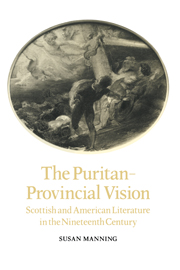Book contents
- Frontmatter
- Contents
- Preface
- Acknowledgements
- 1 Calvin's theology and the puritan mind
- 2 After Armageddon: Jonathan Edwards and David Hume
- 3 From puritanism to provincialism
- 4 The pursuit of the double
- 5 Spectators, spies and spectres: the observer's stance
- 6 ‘Is anything central?’
- Notes
- Bibliography
- Index
1 - Calvin's theology and the puritan mind
Published online by Cambridge University Press: 21 January 2010
- Frontmatter
- Contents
- Preface
- Acknowledgements
- 1 Calvin's theology and the puritan mind
- 2 After Armageddon: Jonathan Edwards and David Hume
- 3 From puritanism to provincialism
- 4 The pursuit of the double
- 5 Spectators, spies and spectres: the observer's stance
- 6 ‘Is anything central?’
- Notes
- Bibliography
- Index
Summary
Calvinism is the natural theology of the disinherited; it never flourished, therefore, anywhere as it did in the barren hills of Scotland and in the wilds of North America.
(H.L. Mencken)Puritanism is not a body of doctrine but a state of mind. John Calvin's Institutes of the Christian Religion (1536–59) was the authoritative codification of Reformation theology; it set out doctrine not merely for the puritan sects but also for the ‘Elizabethan Settlement’ of 1559, which established the Church of England. Theologically, therefore, little separates Anglicans from Calvinists; the distinctions lie all in the way these doctrines are held: they are matters of emphasis, of temper and tone, of degrees or assent or dissent – matters which are finally more susceptible to literary than to theological, historical or political definition. These impalpable turnings of inclination and temperament combine to define two distinct understandings of the nature of man and his relationship to what lies beyond himself, and they determine the contours of what I shall describe as the ‘central’ and ‘provincial’ minds.
Calvin's theology provided a satisfyingly complete and distinctive world picture for those who lived in obedience to its strictest precepts, a picture so powerful that, even after the religious tenets on which it was founded had lost their compulsion, it shaped the imaginations of those brought up in its shadow. The way Calvin formulates Reformation principles at once reflects and enjoins an attitude towards these principles which establishes the puritan mind in embattled opposition to the centres of experience in the world.
- Type
- Chapter
- Information
- The Puritan-Provincial VisionScottish and American Literature in the Nineteenth Century, pp. 1 - 25Publisher: Cambridge University PressPrint publication year: 1990



